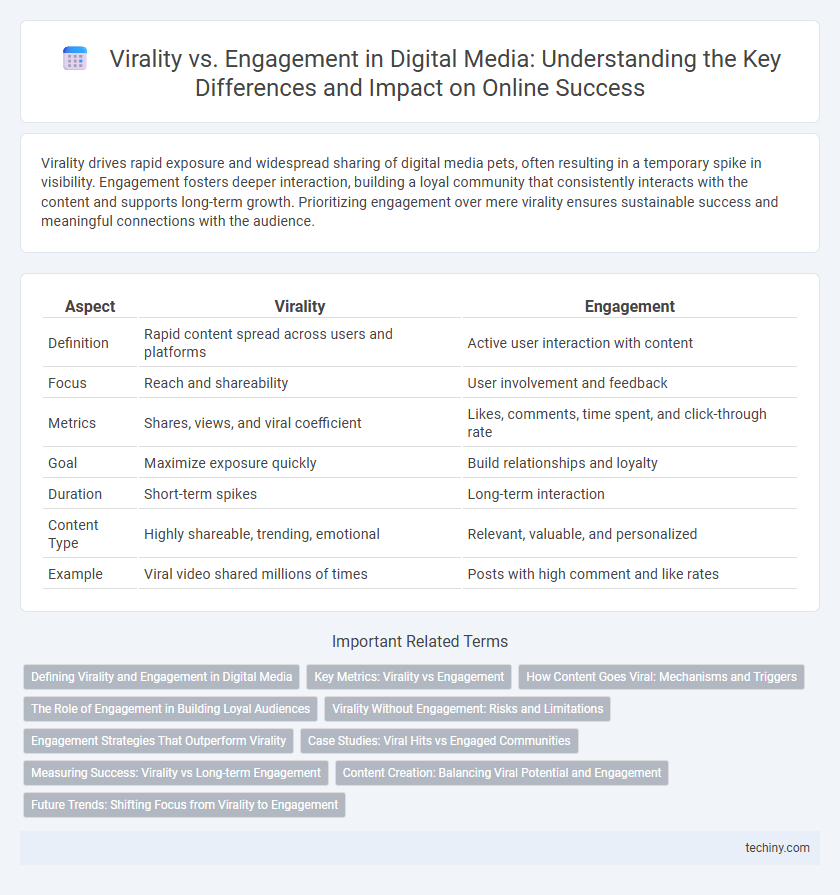Virality drives rapid exposure and widespread sharing of digital media pets, often resulting in a temporary spike in visibility. Engagement fosters deeper interaction, building a loyal community that consistently interacts with the content and supports long-term growth. Prioritizing engagement over mere virality ensures sustainable success and meaningful connections with the audience.
Table of Comparison
| Aspect | Virality | Engagement |
|---|---|---|
| Definition | Rapid content spread across users and platforms | Active user interaction with content |
| Focus | Reach and shareability | User involvement and feedback |
| Metrics | Shares, views, and viral coefficient | Likes, comments, time spent, and click-through rate |
| Goal | Maximize exposure quickly | Build relationships and loyalty |
| Duration | Short-term spikes | Long-term interaction |
| Content Type | Highly shareable, trending, emotional | Relevant, valuable, and personalized |
| Example | Viral video shared millions of times | Posts with high comment and like rates |
Defining Virality and Engagement in Digital Media
Virality in digital media refers to the rapid and widespread sharing of content across platforms, driven by user enthusiasm and network effects. Engagement measures the depth of interaction users have with digital content, including likes, comments, shares, and time spent. Both metrics are critical for digital marketers to evaluate content performance and audience connection.
Key Metrics: Virality vs Engagement
Key metrics in digital media distinguish virality, measured by share and reach rates, from engagement, reflected in likes, comments, and time spent. Virality indicates rapid content spread across networks, while engagement signals audience interaction depth and content resonance. Optimizing both metrics drives broader visibility and meaningful user connections, essential for effective digital strategies.
How Content Goes Viral: Mechanisms and Triggers
Content goes viral primarily through emotional resonance, shareability, and network effects that amplify reach exponentially. Key mechanisms include high-arousal emotions like awe, surprise, or anger that prompt users to share, combined with platform algorithms prioritizing content with rapid engagement spikes. Triggers such as relatable narratives, timely relevance, and influencer endorsements significantly boost the likelihood of viral dissemination across digital media channels.
The Role of Engagement in Building Loyal Audiences
Engagement metrics such as comments, shares, and time spent on content are critical indicators of audience loyalty in digital media. Unlike virality, which measures rapid and widespread content sharing often driven by novelty, engagement reflects sustained interest and meaningful interaction, fostering a deeper connection between creators and audiences. Platforms like Facebook and Instagram prioritize engagement in their algorithms, enhancing visibility for content that cultivates community and long-term audience retention.
Virality Without Engagement: Risks and Limitations
Virality without engagement often results in fleeting attention that lacks meaningful interaction or long-term retention, diminishing overall campaign effectiveness. High share counts without corresponding likes, comments, or conversions indicate shallow user interest, undermining brand loyalty and ROI. Prioritizing true engagement over mere virality ensures lasting digital media impact and sustainable audience growth.
Engagement Strategies That Outperform Virality
Engagement strategies that focus on building authentic connections, such as interactive content, personalized experiences, and community-driven campaigns, consistently outperform virality by fostering long-term audience loyalty. Data shows that posts encouraging meaningful comments and shares generate higher retention rates compared to content that simply goes viral once. Prioritizing quality interactions over fleeting virality results in sustained brand growth and improved lifetime customer value.
Case Studies: Viral Hits vs Engaged Communities
Case studies reveal that viral hits generate rapid, widespread exposure with short-lived attention, while engaged communities foster sustained interaction and brand loyalty over time. Platforms like TikTok showcase viral videos accumulating millions of views quickly, whereas Patreon exemplifies engaged communities driving consistent creator support and meaningful dialogue. Analyzing metrics such as share velocity for virality and repeat interaction rates for engagement highlights the strategic trade-offs in digital media campaigns.
Measuring Success: Virality vs Long-term Engagement
Measuring success in digital media requires balancing virality and long-term engagement metrics to gauge content effectiveness accurately. Virality measures rapid, widespread sharing and can generate immediate exposure, while long-term engagement reflects sustained user interaction, loyalty, and content value over time. Optimizing digital strategies involves analyzing reach, shares, comments, session duration, and repeat visits to prioritize meaningful audience connections beyond fleeting viral spikes.
Content Creation: Balancing Viral Potential and Engagement
Achieving a balance between virality and engagement in digital media content creation requires crafting shareable material that resonates deeply with the target audience's interests and values. Content optimized for virality often leverages emotional triggers and trending formats, while high engagement depends on authenticity, relevance, and fostering meaningful interactions. Effective digital media strategies integrate data analytics to monitor both reach and user response, ensuring sustained audience growth and brand loyalty.
Future Trends: Shifting Focus from Virality to Engagement
Future trends in digital media indicate a strategic shift from prioritizing virality to emphasizing sustained user engagement, as platforms increasingly value meaningful interactions over fleeting reach. Enhanced algorithms now favor content that drives active participation, such as comments, shares, and time spent, boosting long-term audience retention and brand loyalty. Brands leveraging data analytics and engagement metrics are better positioned to create personalized experiences that foster deeper connections and sustained digital growth.
Virality vs Engagement Infographic

 techiny.com
techiny.com